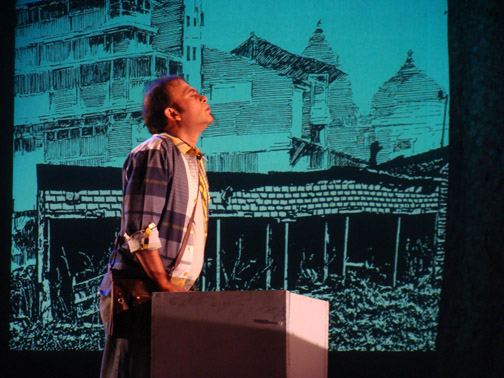The Play
Shakuntala is not a realistic play, but it does have realistic touches and ironic inserts that make it accessible to today’s viewers. It is conceived as a series of stylized interchanges. The work is written in free verse and takes the form of a modern tragicomedy. It is a plea for tolerant coexistence between different nations and cultures, but it is also a veiled condemnation of the global cultural imperialism that subjugates everything that is “other” and “different” to its own interpretation. On the other hand, it tries to reinterpret and understand the meaning of “love.” The reinterpretation of the play, loosely based on The Recognition of Shakuntala by Kalidasa, is two-fold. On the external level, it is a contemporary attempt to replay the best-known love story of classical India in the framework of our present-day reality, with the characteristics of the original characters transposed into three rather ordinary people of today with all the paraphernalia of everyday life. On the level of the plot, the classical story is reinterpreted, at first half-jokingly and then for real, by the two leading characters because they happen to have the same names as the original characters, each with their own cultural references.

Shakuntala, Ganakrishti Theatre Company, Kolkata, India, 2012
Playwright’s note
I believe that the past (as we interpret it) and the present (as we experience it) are mysteriously intertwined, presenting a continuous picture of our human concerns. That is why, in my plays, I tend to draw on literary tradition as much as on my own feelings and thoughts about our contemporary dilemmas. That’s what I did with my previous play, Antigone Now, where I reworked the best-known Western classical play, Antigone by Sophocles, in the light of the prevalent neoliberal capitalist reality to show how political power (and its abuse) and individual will (or its abuse) have changed in the last two thousand years. In the same way I have used Shakuntala, essentially a story about love between two people who are not perceived to be equals, to show the misunderstandings between East and West, two cultures that still fail to achieve a fruitful symbiosis. In the final analysis, my Shakuntala is a condemnation of blind Western superiority.

Evald Flisar (1945, Slovenia). Novelist, short story writer, playwright, essayist, editor. Studied comparative literature in Ljubljana, English literature in London, psychology in Australia. Globe-trotter (travelled in more than 80 countries), underground train driver in Sydney, Australia, editor of (among other things) an encyclopaedia of science and invention in London, author of short stories and radio plays for the BBC, president of the Slovene Writers’ Association (1995 – 2002), since 1998 editor of the oldest Slovenian literary journal Sodobnost (Contemporary Review). Author of eleven novels (six short-listed for kresnik, the Slovenian “Booker”), two collections of short stories, three travelogues (regarded as the best of Slovenian travel writing), two books for children and teenagers (shortlisted for Best Children’s Book Award) and thirteen stage plays (six nominated for Best Play of the Year Award, twice won the award). Winner of the Prešeren Foundation Prize, the highest state award for prose and drama. Various works, especially short stories and plays, translated into 32 languages, among them Bengali, Hindi, Malay, Nepali, Indonesian, Turkish, Greek, Japanese, Chinese, Arabic, Polish, Czech, Albanian, Lithuanian, Icelandic, Russian, Italian, Spanish etc. Stage plays regularly performed all over the world, most recently in Austria, Egypt, India, Indonesia, Japan, Taiwan, Nepal, Bosnia & Herzegovina, Bulgaria and Belarus. Attended more than 50 literary readings and festivals on all continents. Lived abroad for 20 years (three years in Australia, 17 years in London). Since 1990, resident in Ljubljana, Slovenia.
|
|

